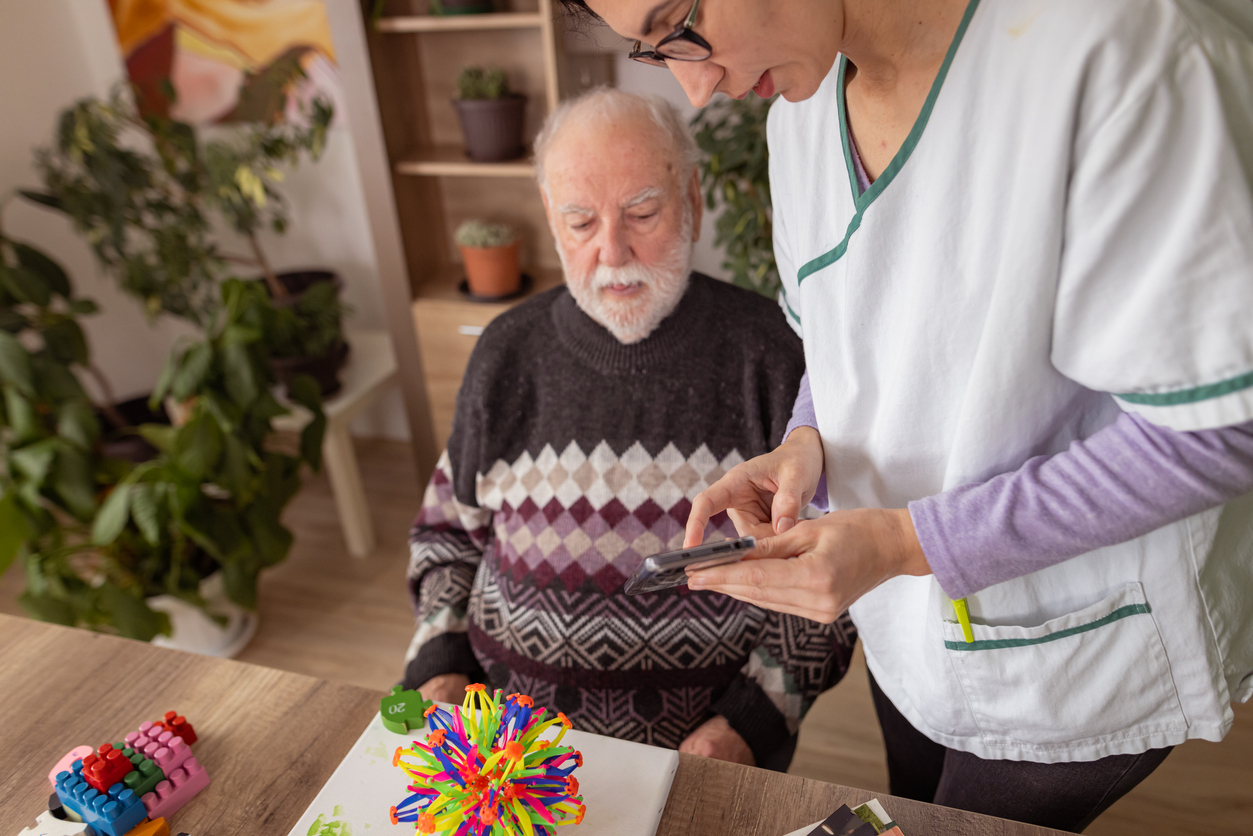
Abstract
Objective: Caregivers of people with dementia (PWD) often face burdens, but engaging in traditional mindfulness practices and spending time in nature can enhance positive emotions. This study aimed to assess the effectiveness and feasibility of nature videos in reducing burden, anxiety, and depression among caregivers of PWD in Thailand. As caregivers are often time poor, a brief 10-minute online mindfulness session was designed to make participation more feasible.
Methods: This randomized controlled trial assigned 47 eligible individuals to 2 groups. The experimental group received dailynature videos for 4 weeks, while the control group received daily self-care guidance. The 12-item Zarit Burden Interview (12-item ZBI), the Patient Health Questionnaire (PHQ-9), the 7-item Generalized Anxiety Disorder-7 (GAD-7), and the Connor Davidson Resilience Scale (CD-RISC) were used to assess caregivers’ burden at baseline and the 4-week follow-up. Recruitment occurred from March 2023 to February 2024.
Results: The mean age was 50.59 years. On average, participants watched videos for 11.49 minutes per day, and the duration was 23 days. Both groups showed a significant decrease in burden at follow-up, but the between-group changes of 12-item ZBI were not significantly different. Brief mindfulness interventions reduced PHQ-9 scores by 4.14 points (P<.001) and increased CD-RISC scores by 5.68 points (P=.001). GAD-7 and PHQ-9 were significantly positively correlated with the 12-item ZBI (r=0.55, P<.001, and r=0.42, P=.005, respectively).
Conclusion: Brief mindfulness interventions through nature videos and receiving self-care advice can reduce the burden among caregivers of PWD and reduce levels of depression.
Trial Registration: Dataset from study at Thaiclinicaltrials.org identifier: TCTR20230216001.
J Clin Psychiatry 2025;86(3):25m15817
Author affiliations are listed at the end of this article.
Members Only Content
This full article is available exclusively to Professional tier members. Subscribe now to unlock the HTML version and gain unlimited access to our entire library plus all PDFs. If you're already a subscriber, please log in below to continue reading.
References (40)

- Connors MH, Seeher K, Teixeira-Pinto A, et al. Dementia and caregiver burden: a three-year longitudinal study. Int J Geriatr Psychiatry. 2020;35(2):250–258. PubMed CrossRef
- Mekawichai P, Saetang S. Caregiver burden among Thai dementia patients’ caregivers. J Psychiatr Assoc Thai. 2013;58(1):101–110.
- Kabat-Zinn J. Mindfulness-based interventions in context: past, present, and future. Clin Psychol Sci Pract. 2003;10(2):144–156. CrossRef
- Shapero BG, Greenberg J, Pedrelli P, et al. Mindfulness-based interventions in psychiatry. Focus. 2018;16(1):32–39. PubMed CrossRef
- Rodrigues MF, Nardi AE, Levitan M. Mindfulness in mood and anxiety disorders: a review of the literature. Trends Psychiatry Psychother. 2017;39(3):207–215. PubMed CrossRef
- Hazlett-Stevens H, Singer J, Chong A. Mindfulness-based stress reduction and mindfulness-based cognitive therapy with older adults: a qualitative review of randomized controlled outcome research. Clin Gerontol. 2019;42(4):347–358. CrossRef
- Whitebird RR, Kreitzer M, Crain AL, et al. Mindfulness-based stress reduction for family caregivers: a randomized controlled trial. Gerontologist. 2013;53(4):676–686. PubMed CrossRef
- Hudson J, Ungar R, Albright L, et al. Older adult caregivers’ experiences in an online, interactive mindfulness intervention. J Evid Based Integr Med. 2020;25:1–10. CrossRef
- Howarth A, Smith JG, Perkins-Porras L, et al. Effects of brief mindfulness-based interventions on health-related outcomes: a systematic review. Mindfulness. 2019;10(10):1957–1968. CrossRef
- Juberg M, Stoll N, Goldin P, et al. Investigating the feasibility and effects of an online mindfulness family caregiver training program. Mindfulness. 2023;14:1531–1541. CrossRef
- Ballew MT, Omoto AM. Absorption: how nature experiences promote awe and other positive emotions. Ecopsychology. 2018;10(1):26–35. CrossRef
- Nisbet EK, Zelenski JM, Grandpierre Z. Mindfulness in nature enhances connectedness and mood. Ecopsychology. 2019;11(2):81–91. CrossRef
- Silpakit O, Chomchuen R, Silpakit C. Psychometric study of the Thai version of Zarit Burden Interview in psychiatric caregivers. J Ment Health Thailand. 2015;23:1.
- Lotrakul M, Sumrithe S, Saipanish R. Reliability and validity of the Thai version of the PHQ-9. BMC Psychiatry. 2008;8(1):46. PubMed CrossRef
- Spitzer RL, Kroenke K, Williams JBW, et al. A brief measure for assessing generalized anxiety disorder: the GAD-7. Arch Intern Med. 2006;166(10):1092–1097. PubMed CrossRef
- Vongsirimas N, Thanoi W, Klainin-Yobas P. Evaluating psychometric properties of the Connor-Davidson Resilience Scale (10-item CD-RISC) among university students in Thailand. J Nurs Sci. 2017;35(3):11.
- Whitehead AL, Julious SA, Cooper CL, et al. Estimating the sample size for a pilot randomised trial to minimise the overall trial sample size for the external pilot and main trial for a continuous outcome variable. Stat Methods Med Res. 2016;25(3):1057–1073. PubMed CrossRef
- Tahsin F, Stanyon W, Sun W, et al. A single mindfulness session with informal caregivers of seniors living with dementia: a pilot qualitative descriptive study. Aging Clin Exp Res. 2021;33(2):391–397. CrossRef
- Gu J, Strauss C, Bond R, et al. How do mindfulness-based cognitive therapy and mindfulness-based stress reduction improve mental health and wellbeing? A systematic review and meta-analysis of mediation studies. Clin Psychol Rev. 2015;37:1–12. PubMed CrossRef
- Liu Z, Chen QL, Sun YY. Mindfulness training for psychological stress in family caregivers of persons with dementia: a systematic review and meta-analysis of randomized controlled trials. Clin Interv Aging. 2017;12:1521–1529. PubMed CrossRef
- Ponce CC, Ordonez TN, Lima-Silva TB, et al. Effects of a psychoeducational intervention in family caregivers of people with Alzheimer’s disease. Dement Neuropsychol. 2011;5(3):226–237. PubMed CrossRef
- Marchand WR. Neural mechanisms of mindfulness and meditation: evidence from neuroimaging studies. World J Radiol. 2014;6(7):471–479. PubMed CrossRef
- Hölzel BK, Carmody J, Vangel M, et al. Mindfulness practice leads to increases in regional brain gray matter density. Psychiatry Res. 2011;191(1):36–43.
- Benchimol-Elkaim B, Khoury B, Tsimicalis A. Nature-based mindfulness programs using virtual reality to reduce pediatric perioperative anxiety: a narrative review. Front Pediatr. 2024;12:1334221. CrossRef
- Hanley AW, Derringer SA, Hanley RT. Dispositional mindfulness may be associated with deeper connections with nature. Ecopsychology. 2017;9(4):225–231. CrossRef
- Djernis D, Lerstrup I, Poulsen D, et al. A systematic review and meta-analysis of nature-based mindfulness: effects of moving mindfulness training into an outdoor natural setting. Int J Environ Res Public Health. 2019;16(17):3202. CrossRef
- Vespa A, Spatuzzi R, Fabbietti P, et al. Association between care burden, depression and personality traits in Alzheimer’s caregiver: a pilot study. PLoS One. 2021;16(9):e0251813. CrossRef
- Liu S, Li C, Shi Z, et al. Caregiver burden and prevalence of depression, anxiety, and sleep disturbances in Alzheimer’s disease caregivers in China. J Clin Nurs. 2017;26(9–10):1291–1300. PubMed CrossRef
- Fang L, Dong M, Fang W, et al. Relationships between care burden, resilience, and depressive symptoms among the main family caregivers of stroke patients: a cross-sectional study. Front Psychiatry. 2022;13:960830. CrossRef
- Cui P, Yang M, Hu H, et al. The impact of caregiver burden on quality of life in family caregivers of patients with advanced cancer: a moderated mediation analysis of the role of psychological distress and family resilience. BMC Public Health. 2024;24(1):817. CrossRef
- Oh VKS, Sarwar A, Pervez N. The study of mindfulness as an intervening factor for enhanced psychological well-being in building the level of resilience. Front Psychol. 2022;13:1056834. CrossRef
- Smith BW, Dalen J, Wiggins K, et al. The Brief Resilience Scale: assessing the ability to bounce back. Int J Behav Med. 2008;15(3):194–200. PubMed CrossRef
- Linder J, Mancini JA. Observations on the relationship between resilience and mindfulness. CFTSR. 2020;3(2):1. CrossRef
- Prosser SJ, Metzger M, Gulbransen K. Don’t just survive, thrive: understanding how acute psychiatric nurses develop resilience. Arch Psychiatr Nurs. 2017;31(2):171–176. PubMed CrossRef
- Wu G, Feder A, Cohen H, et al. Understanding resilience. Front Behav Neurosci. 2013;7:10.
- Moore A, Malinowski P. Meditation, mindfulness and cognitive flexibility. Conscious Cogn. 2009;18(1):176–186. PubMed CrossRef
- Gál É, Ştefan S, Cristea IA. The efficacy of mindfulness meditation apps in enhancing users’ well-being and mental health-related outcomes: a meta-analysis of randomized controlled trials. J Affect Disord. 2021;279:131–142.
- Kubo A, Altschuler A, Kurtovich E, et al. A pilot mobile-based mindfulness intervention for cancer patients and their informal caregivers. Mindfulness. 2018;9(6):1885–1894. CrossRef
- Goldberg SB, Knoeppel C, Davidson RJ, et al. Does practice quality mediate the relationship between practice time and outcome in mindfulness-based stress reduction? J Couns Psychol. 2020;67(1):115–122. PubMed CrossRef
- Rigby T, Ashwill RT, Johnson DK, et al. Differences in the experience of caregiving between spouse and adult child caregivers in dementia with Lewy bodies. Innov Aging. 2019;3(3):igz027. PubMed CrossRef





